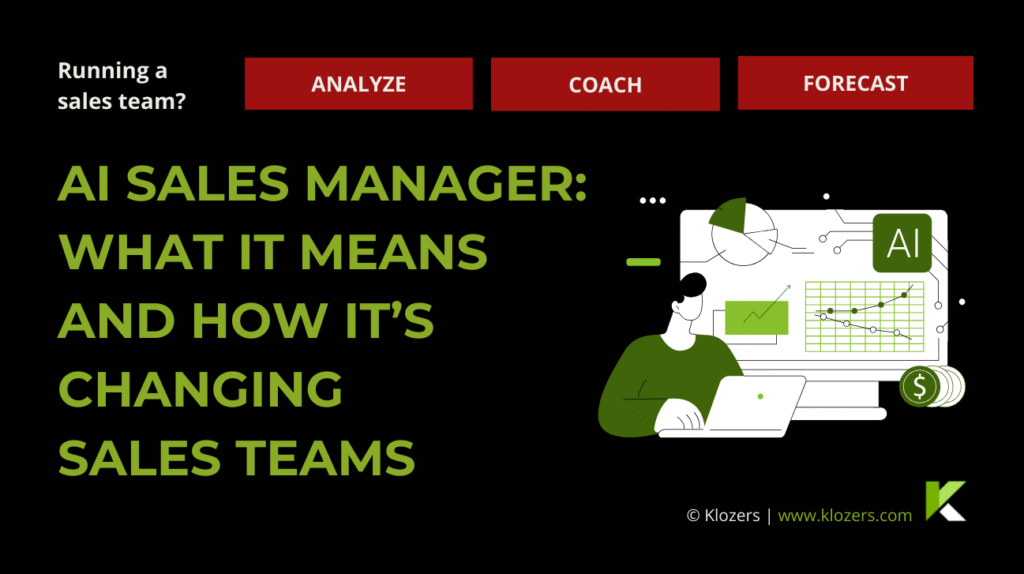AI SALES Manager - Top Question FRom Google
How to use AI as a Sales Manager?
Using AI as a Sales Manager involves using intelligent tools for better sales results. AI helps you identify ready-to-buy leads, send out personalized messages to the target audience, and reduce time spent on routine administrative tasks. AI sales team management also assists with picking up important patterns in calls, tracking email activity, and understanding how buyers behave.
Free access to our best tools and templates
Introduction: AI Sales Manager
A sales manager has a lot of responsibilities, including handling deal reviews, watching out for missed opportunities in the sales process, managing and coaching the sales team, as well as tracking their performance. AI can help sales managers handle these tasks better and faster. AI sales management is also becoming necessary because the traditional sales methods, like cold calling, for instance, cannot keep up with today’s longer buying process, and the pressure to deliver consistent revenue goals.
When most or all of the sales team works remotely, AI tools can help everyone stay organized and work more efficiently. They can gather and organize customer data in one place, so your team can stay updated without the need for repeated emails or meetings. Additionally, these tools can analyze the calls and emails sent to prospects and coach your team on how to maintain high sales standards. This saves sales managers the time and effort of reviewing each sales representative’s calls to track their progress and spot areas for improvement.
The question now is not whether AI can support sales management, but how it can be used effectively. So, what does AI in sales management look like in day-to-day operations, and what should sales managers keep in mind before deciding to make the switch?
Function of an AI Sales Manager
The term “AI sales manager” refers to a platform that helps sales leaders manage pipelines, coach their team, and monitor sales performance more efficiently. It does not replace human leadership but supports it with data-driven insights.
1. Pipeline Analysis
AI tools analyze your current pipeline with data from past performance to highlight deals likely to close and those at risk. They use inputs like CRM updates, deal momentum, email patterns, and call notes to give you a proper understanding of each deal’s status.
2. Team Activity Monitoring
These tools track your team’s activities, including how often they reach out to prospects, follow up, and move deals forward. Managers can see how much workload each sales representative has and how consistently they are following up with prospects. This helps them see missed opportunities or signs that someone might be burning out, before it turns into a bigger problem.
3. Real Time Deal Coaching
An AI Sales Manager can offer suggestions on how to close a deal based on the specific situation and patterns from successful deals. It can recommend what content to send out or which objections from buyers to prepare for. It can even let your team know when it is the right time to bring in extra support to get a deal closed, like a product expert or a senior manager.
4. Forecasting Support
A good AI sales management platform creates more accurate sales forecasts by analyzing close rates, deal stages, and buyer behavior. This allows managers to plan confidently and reduce last-minute surprises.
5. Reminders and Nudges
AI tools send timely reminders when deals stall or tasks are overdue. These nudges help reps stay focused, keep CRM data up to date, and maintain the momentum.
The Limitations of AI Sales Managers
AI sales managers can be powerful tools, but they are not perfect, and they are not a replacement for human leadership. So, to get the most out of them, you should understand where their limits lie and how to work around them.
Expect Gaps if Data is Inaccurate
AI tools rely on complete, accurate data. So, if your team is not logging calls, updating deal stages, or using the CRM consistently, the insights you get will be incomplete or misleading.
AI Doesn’t Always understand Context or Intent
It can show you how many times your team followed up with a prospect, but it won’t tell you if their tone felt pushy, if the buyer had some issues that slowed their decision-making process, or if the deal was lost because the buyer’s priorities changed. You should still rely on your judgment and conversations with sales representatives to fill in the gaps AI can’t see.
You Shouldn’t Delegate Coaching Entirely to a Tool
AI can suggest next steps, but it doesn’t build trust. Your team still needs direct feedback, support, and leadership. You should treat AI as a helpful assistant, not as a replacement for your role as a manager.
How to Choose an AI Management Software
When you are deciding on the right AI sales management software, you should focus on how well it fits into your team’s day-to-day work, not just on the number of features it offers. Ideally, it should work easily with the tools you already use, like your CRM, email system, and call software, so your team does not waste time switching between platforms or re-entering data.
You should also be able to clearly understand the insights it provides. If it is giving you scores or predictions, they need to come with explanations, or it will be hard to trust or act on them. The tool should be flexible enough to reflect how your team sells, including your process and the language you use.
Most importantly, the insights it gives should lead to real action. It should help your team know what to do next and give you a clearer view of how deals are moving. The right tool should simplify your workflow, not complicate it, making it easier for your team to sell and for you to lead.
AI Sales Manager Implementation Strategy
If you are just trying out an AI sales manager tool, start small by choosing one or two high-impact areas where AI can make an immediate difference, like automating repetitive tasks or analyzing sales data more efficiently. This helps your team see quick wins and gives the system time to learn and adjust before you expand it into more complex parts of your process.
When you introduce the platform to your team, be upfront that this isn’t about replacing people but helping them do their best work. It is normal for your team to feel a bit unsure about AI at first, especially if it seems like they’re being watched. So, make it clear that the goal is to give them smarter support, not more pressure, and help them win more deals, improve skills, and hit targets faster.
Start small by introducing it to a few team members who are open to trying new tools. Their early wins will give others the confidence to jump in too. Your training should focus on how the AI helps in real situations, not just how to use the platform, but how to use it well.
You should also aim to weave the AI into your current workflows, so it feels like a natural part of the process, not something extra to manage. When the tool works with how your team already sells, adoption becomes much easier. Finally, remember that implementation isn’t a one-time job. Set up regular check-ins to review what is working, tweak what is not, and keep improving.
Customizing for Your Industry
Sales look different in every industry, so your AI sales manager should be able to adapt to the way your team works. The best platforms give you room to customize not just in features, but in language, workflows, and compliance needs. In financial services, for example, you might need tools that help your team follow strict disclosure rules or flag any language that could raise compliance concerns.
For manufacturing and industrial sales, customization often means training the system to recognize technical specifications and track detailed product setups discussed with customers. Healthcare and pharma sales teams usually rely on AI tools that can recognize medical terms and help work around regulations like HIPAA.
These systems can even keep track of how often competitors or treatment alternatives come up in conversations. In tech and software, AI tools are tuned to pick up on product demo feedback, recognizing when a customer seems confused about a feature and suggesting ways to explain it more clearly, based on what’s worked before.
For professional services firms, custom AI can help keep track of project discussions to catch when expectations start to drift, so you can avoid scope creep and keep your work profitable. Most platforms come with industry-specific templates to help you get started quickly. From there, you can refine the setup to match your team’s exact sales process, language, and customer needs.
ACTIONABLE TIP
Actionable Tip: Start Slow and See How it Works for You
Klozers recommends starting with one high-impact use case for your AI sales manager, like pipeline analysis or task automation, before rolling it out across the team. Quick wins build trust and speed adoption.
Final Thoughts for AI Sales Manager
AI sales managers are not meant to replace your team or take control of the sales process. They are there to support your sales representatives by helping them spend less time on manual tasks and more time on closing meaningful deals. When used the right way, these tools can bring structure, visibility, and consistency to your sales efforts.
If you are dealing with challenges like missed follow-ups, scattered data, or pressure to forecast more accurately, AI can be a helpful part of the solution. However, it’s not a shortcut. It works best when used to support a team that is already committed to doing the basics well.







